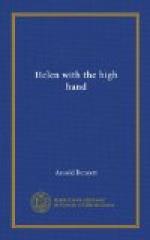The strain was terrible—like waiting for a gun to go off. James was conscious of a strange vibration by his side, and saw that Jos Swetnam had got the whole of a lace handkerchief into her mouth.
The gun went off—not with a loud report, but with a gentle and lofty tenor piping, somewhere in the neighbourhood of F, or it might have been only E (though, indeed, a photograph would have suggested that Emanuel was singing at lowest the upper C), and the performer slowly resumed his normal stature.
“O Love!” he had exclaimed, adagio and sostenuto.
Then the piano, in its fashion, also said: “O Love!”
“O Love!” Emanuel exclaimed again, with slight traces of excitement, and rising to heights of stature hitherto undreamt of.
And the piano once more, in turn, called plaintively on love.
It would be too easy to mock Emanuel’s gift of song. I leave that to people named Swetnam. There can be no doubt Emanuel had a very taking voice, if thin, and that his singing gave pleasure to the majority of his hearers. More than any one else, it pleased himself. When he sang he seemed to be inspired by the fact, to him patent, that he was conferring on mankind a boon inconceivably precious. If he looked a fool, his looks seriously misinterpreted his feelings. He did not spare himself on that evening. He told his stepmother’s guests all about love and all about his own yearnings. He hid nothing from them. He made no secret of the fact that he lived for love alone, that he had known innumerable loves, but none like one particular variety, which he described in full detail. As a confession, and especially as a confession uttered before many maidens, it did not err on the side of reticence. Presently, having described a kind of amorous circle, he came again to: “O Love!” But this time his voice cracked: which made him angry, with a stern and controlled anger. Still singing, he turned slowly to the pianist, and fiercely glared at the pianist’s unconscious back. The obvious inference was that if his voice had cracked the fault was the pianist’s. The pianist, poor thing, utterly unaware of the castigation she was receiving, stuck to her business. Less than a minute later, Emanuel’s voice cracked again. This time he turned even more deliberately to the pianist. He was pained. He stared during five complete bars at the back of the pianist, still continuing his confession. He wished the audience to understand clearly where the blame lay. Finally, when he thought the pianist’s back was sufficiently cooked, he faced the audience.
“I hope the pianist will not be so atrociously clumsy as to let my voice crack again,” he seemed to be saying.
Evidently his reproof to the pianist’s back was effectual, for his voice did not crack again.
And at length, when Jos had communicated her vibration to all her family, and every one had ceased to believe that the confession would ever end, the confession did end. It ended as it had begun, in an even, agreeable tenor piping. Emanuel was much too great an artist to allow himself to be carried away by his emotion. The concluding words were, “Oh, rapture!” and Emanuel sang them just as if he had been singing “One-and-eleven-pence three-farthings.”




